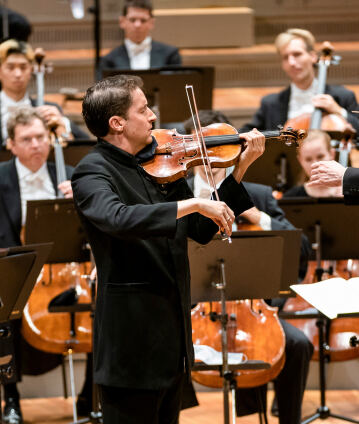Marek Janowski and Noah Bendix-Balgley

With this programme we commemorate Max Bruch, the 100th anniversary of whose death is remembered in 2020. Our 1st concertmaster, Noah Bendix-Balgley, is the soloist in this performance of Bruch’s First Violin Concerto with the Berliner Philharmoniker under the baton of Marek Janowski. With its yearning opening movement and sparkling finale, this work became the composer’s most popular work. The second part of the concert is dedicated to Johannes Brahms, a contemporary of Bruch. His Serenade No. 2 is characterised by the dark, warm sound typical of Brahms and is considered a milestone on the composer’s path to the symphony.
The Cologne-born Max Bruch was not exactly known for his modesty throughout his life. Especially when it came to defending his conservative style against attacks from the progressive camp, he could descend into the realms of polemics. He was also annoyed by the fact that critics constantly compared him to Johannes Brahms, who was five years his senior, to Bruch’s disadvantage. “If I meet Brahms in heaven,” Bruch once wrote in frustration to their joint publisher Fritz Simrock, “I’ll have myself transferred to hell!”.
With the maturity of an almost 70-year-old, however, Bruch candidly stated in an interview: “For various reasons, Brahms was a far greater composer than I was. In 50 years’ time, his splendour will shine brightly as the most outstanding composer of all time, while I will be remembered mainly for my Violin Concerto in G minor.” This realisation was undoubtedly bitter for Bruch, all the more so as this was a work written in his youth. Bruch was in his mid-twenties when he created his first major instrumental work with the active assistance of violinist Joseph Joachim. The concerto, which audibly follows in the footsteps of Mendelssohn and combines a lyrical, singing tone with weightless virtuosity and a then popular Hungarian inflection in the finale, quickly became an audience favourite after its acclaimed premiere in 1868. However, its success turned into a curse for Bruch – precisely because the public only wanted to hear this one work by him.
Johannes Brahms, on the other hand, took a long time to find his way to the symphony. The attempt to rework a sonata for two pianos into a large-scale orchestral work resulted in the First Piano Concerto, whose Leipzig premiere in 1859 proved to be a fiasco. Alongside this project, he worked on two orchestral serenades. For the second, Brahms was inspired by Mozart’s wind serenades. The low register of the winds, reinforced by violas, cellos and double basses, gives the work a particularly warm sound. The composer, who was notorious for his irony, rarely wrote so enthusiastically about one of his works as he did about his “gentle” serenade: “I have rarely written music with greater delight; it sounded so lovely and yielding to me that I was overjoyed.” This remained Johannes Brahms’s last orchestral work for a long time: the music world would have to wait another 16 years for his First Symphony.
© 2020 Berlin Phil Media GmbH
Related interviews